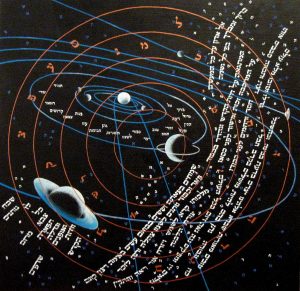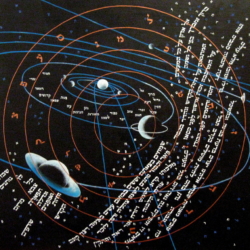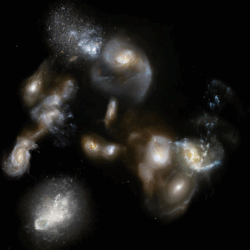| Source (Hebrew) | Translation (English) |
|---|---|
אֵל אָדוֹן עַל כָּל־הַמַּעֲשִׂים בָּרוּךְ וּמְבֹרָךְ בְּפִי כָל־נְשָׁמָה גָּדְלוֹ וְטוּבוֹ מָלֵא עוֹלָם דַּעַת וּתְבוּנָה סוֹבֲבִים אוֹתוֹ |
A gentle Lord of all that is Blessed and loved by each soul alive. Great and good You fill all space. Delight there is in knowing You. |
הַמִּתְגָּאֶה עַל חַיּוֹת הַקֹּדֶשׁ וְנֶהְדָּר בְּכָבוֹד עַל הַמֶּרְכָּבָה זְכוּת וּמִישׁוֹר לִפְנֵי כִסְאוֹ חֶסֶד וְרַחֲמִים לִפְנֵי כְבוֹדוֹ |
How You transcend all holy life Which bears You high above any throne Zekhut and equity radiate from You Ḥesed and compassion the worlds reflect. |
טוֹבִים מְאוֹרוֹת שֶׁבָּרָא אֱלֹהֵינוּ יְצָרָם בְּדַעַת בְּבִינָה וּבְהַשְׂכֵּל כֹּחַ וּגְבוּרָה נָתַן בָּהֶם לִהְיוֹת מוֹשְׁלִים בְּקֶרֶב תֵּבֵל |
The stars and the planets You made to give light You formed them all conscious, all worthy and wise Knowledge and power You gave them to shine Like powerful assistants they serve You in space. |
מְלֵאִים זִיו וּמְפִיקִים נוֹגַהּ נָאֶה זִיוָם בְּכָל־הָעוֹלָם שְׂמֵחִים בְּצֵאתָם וְשָׂשִׂים בְּבוֹאָם עוֹשִׂים בְּאֵימָה רְצוֹן קוֹנָם |
Much light and energy they radiate forth No place is untouched by their gentle rays So joyful their path is, so happy their course Enroute to fulfill their Creator’s command. |
פְּאֵר וְכָבוֹד נוֹתְנִים לִשְׁמוֹ צָהֳלָה וְרִנָּה לְזֵכֶר מַלְכוּתוֹ קָרָא לַשֶּׁמֶשׁ וַיִּזְרַח אוֹר רָאָה וְהִתְקִין צוּרַת הַלְּבָנָה |
Praising Your glory, they honor Your name Singing Your Majesty’s anthem of joy. Quietly suns shine to answer Your call Reflections of moonlight change size at Your word. |
שֶׁבַח נוֹתְנִים לוֹ כָּל־צְבָא מָרוֹם תִּפְאֶרֶת וּגְדֻלָּה שְׂרָפִים וְאוֹפַנִּים וְחַיּוֹת הַקֹּדֶשׁ |
Seraphim, angels, and all heavenly hosts They praise You in concert with Sfirot on high All elements Mingle their harmonious tune Nature and mankind the rhythm provide. |
This “praying translation” of the piyyut El Adon appears in Rabbi Zalman Schachter-Shalomi’s Sabbath Supplement to his Siddur Tehillat Hashem Yidaber Pi ~ As I Can Say It (for Praying in the Vernacular) (2009).
Note that in El Adon, the acrostic line for the letter samekh uses the sin in it’s stead, the two being phonetically equivalent.
Macy Nulman writes in his entry on “Ayl Adon” in Encyclopedia of Jewish Prayer (1993, pp. 61-62):
A Piyyut arranged in alphabetical acrostic form recited in the Yotzayr benediction on Shabbat and, according to the Ashkenazic rite, on a festival day when it coincides with Shabbat. If the festival day is a weekday, it is omitted. Sephardim recite Ayl Adon (“God, the Master of all works”) on Shabbat and even on festivals that occur on weekdays. The poem is alluded to in the Talmud[1] Hagigah 3b. and appears in the Zohar,[2] Terumah 132a, Vayakhayl 205b. and it is generally attributed to the Yorday Merkavah (the Riders on the Chariot), mystics of the eighth century. The chariot referred to in the Piyyut (“and is splendrous in glory above the chariot”) is derived from the vision of Ezekiel in his Ma’asayh Merkavah prophesy (Ezekiel chaps. 1 and 10).
The poem, introduced into the Sabbath liturgy by the Ge’onim, has no uniformity in meter. Its alphabetical arrangement is to illustrate that God created the world for the sake of the Torah, which is written in twenty-two letters of the Hebrew alphabet.[3] Abudraham. ) The first verses (Ayl and Barukh) each contain five words, adding up to ten and alluding to the “ten words” by which God created the world.[4] Avot 5.1. The two final verses (Shevah and Tiferet) have six words each, a total of twelve, to correspond to the twelve zodiacal signs.[5] Berakhot 32b. The intermediate eighteen verses (from Godlo to Ra’ah) contain four words, the total adding up to seventy-two, which corresponds to the Divine Name of seventy-two letters.[6] Cf. Kol Bo; see also Zohar, Parshat Terumah.
The poem is an homage to God for the creation of the heavenly hosts–the sun, the moon, and stars. After having mentioned the sun and moon, whose functions are well known, the author also alludes to the five planets, Shabtai (Saturn), Nogah (Venus), Kokhav (Mercury), Tzedek (Jupiter), and Ma’adim (Mars) by means of the initial words of the next to the final verse, Shevah Notnim Kol Tzeva Marom.[7] Iy Tef, vol. 1, p.682; cf. also Shabbat 156a. Although there are several textual variations between Ashkenazim and Sephardim , both have the same number of words in the poem, based on the dictum that one not alter the number of words in Ayl Adon.[8] Magen Avraham to OH, chapter 281.
Source(s)


Notes

“אֵל אָדוֹן (אשכנז) | El Adōn, a piyyut attributed to the Yordei Merkavah (interpretive translation by Rabbi Zalman Schachter-Shalomi)” is shared through the Open Siddur Project with a Creative Commons Attribution-ShareAlike 4.0 International copyleft license.








Leave a Reply